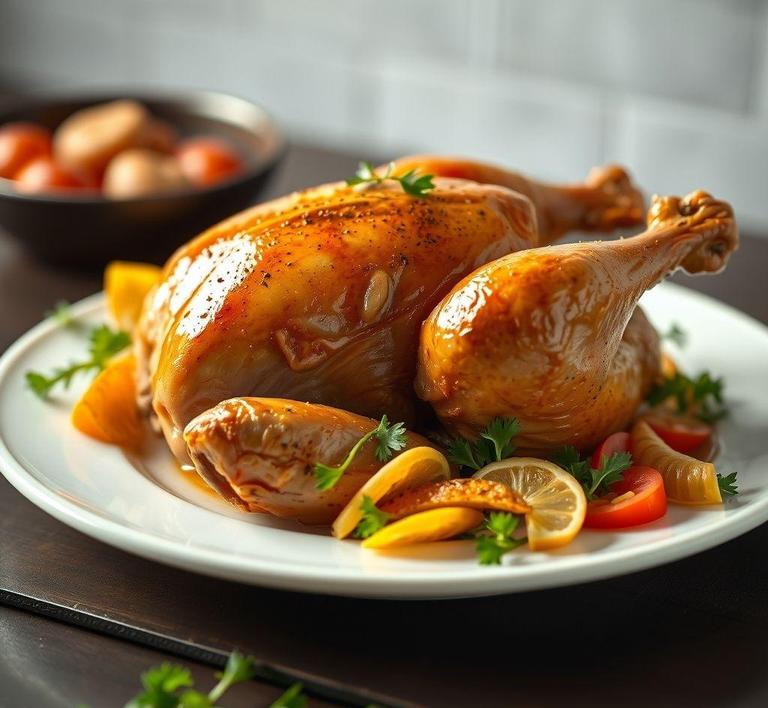Refreezing cooked turkey is a topic that often leaves people scratching their heads, and it’s understandable why! After a big feast, many of us are left with delicious leftovers, but the question remains: can you safely refreeze cooked turkey? The answer is yes, but with some important guidelines. Whether you’re looking to save that extra Thanksgiving turkey or make use of leftovers, knowing how to handle cooked turkey safely is essential to keep it tasting fresh and prevent any potential health risks. In this guide, we’ll dive into the do’s and don’ts of refreezing cooked turkey, along with helpful tips to ensure your turkey stays as tasty as the day it was cooked!
Can You Refreeze Cooked Turkey?

The question of whether you can refreeze cooked turkey often arises when dealing with leftovers, and the simple answer is: yes, you can refreeze cooked turkey. However, the process is not as straightforward as just tossing it back in the freezer. There are several important factors to consider in order to ensure both the safety and quality of the turkey when you choose to refreeze it.
When turkey is cooked and then thawed, it becomes susceptible to bacterial growth if not handled properly. The general rule of thumb with freezing and thawing meat is that once something has been thawed in the refrigerator, it can usually be refrozen as long as it hasn’t been left out at room temperature for more than two hours (or one hour if the temperature is over 90°F). When cooked turkey is thawed in the refrigerator and handled correctly, refreezing can be done safely without significant risk to health.
However, it’s essential to be mindful of the two key things when refreezing: temperature control and time. If your cooked turkey was left out at room temperature for more than two hours, it should be discarded, as it may harbor harmful bacteria that can lead to foodborne illnesses.
How To Refreeze Cooked Turkey?
Refreezing cooked turkey requires a few careful steps to ensure the turkey remains safe to eat and retains as much of its flavor and texture as possible.
- Cool the Turkey Quickly: After cooking, allow the turkey to cool down to room temperature, but do so within a couple of hours. Avoid leaving the turkey out for extended periods. The faster you cool the turkey, the less time it will spend in the ‘danger zone’ (40°F to 140°F) where bacteria grow most quickly.
- Divide into Smaller Portions: If you have a large quantity of cooked turkey, it’s a good idea to divide it into smaller, more manageable portions. This not only makes it easier to store but also allows for faster thawing when you’re ready to use it. Small portions also prevent you from having to refreeze the entire batch again after partially defrosting a large quantity.
- Package for Freezing: Use airtight containers, freezer bags, or vacuum-seal bags to store the turkey. The packaging should be moisture-proof and able to prevent air exposure, as air can cause freezer burn, leading to a dry, less flavorful turkey when you eventually thaw it.
- Label and Date the Packaging: It’s easy to forget when something was frozen, so label each portion with the date it was cooked and frozen. This way, you can keep track of how long it’s been in the freezer and ensure it’s used within the ideal time frame (which we’ll discuss in the next section).
- Place in the Freezer: Make sure the freezer is at 0°F or lower. Avoid overloading the freezer, as this can raise the internal temperature and cause freezing issues. The turkey should be placed in a spot where air can circulate around the bags or containers.
Quality Impact
While you can refreeze cooked turkey, it’s important to understand that each time the turkey is frozen and thawed, its quality will be impacted. The texture, flavor, and moisture content of the turkey will gradually degrade with each freeze-thaw cycle. Here’s a breakdown of the quality changes you may experience:
- Texture Changes: Turkey that has been frozen and refrozen often undergoes changes in its texture. Freezing causes the water inside the turkey to form ice crystals. These ice crystals can puncture the cell walls of the meat, leading to a mushier, drier texture once the turkey is thawed. The turkey may lose some of its original tenderness and juiciness, especially if it was a particularly moist cut of meat to begin with.
- Flavor Alteration: While freezing does not typically impact the flavor of turkey in a major way, refreezing can cause some flavor degradation. The longer the turkey is stored in the freezer, the more it may lose its freshness. Additionally, freezer burn, which occurs when food is exposed to air, can result in a dry, bland taste. The sealed packaging helps mitigate this, but it’s still a consideration to bear in mind.
- Moisture Loss: One of the biggest impacts of refreezing cooked turkey is the loss of moisture. With each freeze-thaw cycle, moisture is lost from the meat. If turkey is frozen improperly (without vacuum sealing or airtight packaging), it will dry out even faster, making it less pleasant to eat once thawed. As moisture escapes, the turkey may become stringy or tough.
- Nutrient Retention: Although there will be slight degradation of the turkey’s flavor and texture, the actual nutritional content-such as protein and fat content-remains relatively stable even after refreezing. The impact on nutrients is minimal compared to the impact on taste and texture.
While you can refreeze cooked turkey, it’s crucial to follow proper guidelines to maintain food safety and minimize any negative effects on quality. The turkey must be cooled properly and stored in airtight packaging to preserve its safety and avoid freezer burn. Although refreezing can affect the texture, flavor, and moisture of the turkey, as long as the turkey has been handled properly and refrozen within a safe time frame, it can be an excellent way to preserve leftovers.
If you’re aiming for the best taste and texture, try to avoid refreezing too many times. If you know you won’t finish all the cooked turkey, freezing it in smaller portions from the start can help maintain its quality over time. Ultimately, the decision to refreeze cooked turkey is one that balances convenience with quality, but as long as safety protocols are observed, you can rest assured knowing that your turkey will remain both safe and edible, even if not quite as flavorful as when it was first cooked.
Is It Safe To Refreeze Cooked Turkey?
Refreezing cooked turkey is a common concern for many, especially after a large holiday meal. The general rule of thumb when it comes to freezing meat-whether it’s turkey, chicken, or beef-is that once food has been thawed, it should not be refrozen unless it is cooked first. But when it comes to cooked turkey, the situation is a bit more nuanced, and understanding the safety protocols can help you make the best decision.
The primary concern with refreezing cooked turkey revolves around food safety, especially the potential growth of harmful bacteria. Turkey, like any poultry, can carry bacteria such as Salmonella or Campylobacter, and these pathogens can proliferate rapidly when the meat is left at room temperature. The risk of bacterial growth is higher if the turkey is thawed improperly or if it has spent too long in the "danger zone" (between 40°F and 140°F).
In general, if your cooked turkey has been kept at safe temperatures (either below 40°F in the refrigerator or at a consistent temperature in the freezer), it should be safe to refreeze. However, there are a few caveats to keep in mind. For example, the turkey should have been cooked initially and stored promptly after it cooled down. Additionally, it should not have been sitting out at room temperature for extended periods before being frozen again.
To minimize the risks, always refreeze cooked turkey within three to four days of it being originally cooked. If you refreeze it later than this, the quality and safety could be compromised due to prolonged exposure to temperatures that support bacterial growth.
Signs That Cooked Turkey Should Not Be Refrozen
While it may be tempting to save leftover turkey for later, there are certain signs you should look out for to determine if the cooked turkey has gone bad and is not safe for refreezing. It’s important to trust your senses (sight, smell, and touch) when assessing the condition of the turkey.
- Off Smell: The most telling sign that cooked turkey should not be refrozen is an unpleasant, sour, or rancid odor. Fresh turkey has a mild aroma when cooked, but if the meat begins to smell foul or off in any way, bacteria have likely started to grow. If you detect a bad odor, it’s a strong indication that the turkey should be discarded.
- Slimy or Sticky Texture: When turkey starts to go bad, the texture of the meat will change. It may become slimy or sticky to the touch. This is usually a result of the breakdown of proteins and the growth of bacteria. If the surface of the turkey feels unusually slimy, it should not be refrozen, as this could lead to foodborne illness.
- Discoloration: Freshly cooked turkey is typically a pale, light brown color. If you notice any greenish, grayish, or excessively dark patches, it indicates spoilage. The discoloration is a sign that bacteria or mold might be present. Discolored turkey should be thrown away and not refrozen.
- Unusual Taste: If you sample a small bite of the turkey and it tastes sour, tangy, or strange, do not risk consuming or refreezing it. The taste of spoiled turkey is a clear indicator that it is no longer safe to eat.
- Extended Time Outside the Refrigerator: Turkey that has been left at room temperature for longer than two hours (or one hour if the room temperature is over 90°F) is at risk for bacterial growth. If it’s been sitting out for too long, refreezing it is unsafe, and you should discard the meat.
Common Refreezing Mistakes
Refreezing cooked turkey might sound straightforward, but there are several common mistakes people make that can compromise both the safety and the quality of the meat. Here are some things to avoid when refreezing cooked turkey:
- Improper Cooling: One of the most common mistakes is failing to cool the turkey down to a safe temperature before freezing it. After cooking, turkey should be refrigerated within two hours to prevent bacterial growth. If it’s left at room temperature for too long before being placed in the fridge, bacteria can grow rapidly, making the meat unsafe to eat-even after refreezing.
- Refreezing After Multiple Thaws: The process of thawing and refreezing can affect the quality of the meat. Each time turkey is thawed, the texture can become drier and tougher. If you’re constantly thawing and refreezing turkey, the meat may become tough and unappetizing, even if it’s technically safe to eat. Try to avoid refreezing turkey multiple times, as this will affect the texture and taste.
- Not Packaging It Properly: Proper packaging is essential when refreezing cooked turkey. If turkey is not wrapped tightly or sealed in an airtight container, freezer burn can occur. Freezer burn happens when air comes into contact with the meat, causing it to dry out and lose its flavor. For best results, wrap the turkey tightly in plastic wrap, aluminum foil, or place it in a sealed freezer bag or container to avoid freezer burn.
- Not Labeling the Meat: Forgetting to label the frozen turkey can lead to confusion later. Always write the date when the turkey was originally cooked and frozen. If you don’t have a clear timeline, you risk keeping the meat in the freezer too long, which can impact both its safety and flavor.
- Freezing Excess Fat or Gravy: Many people mistakenly freeze turkey with gravy or excessive fat. When you freeze turkey along with its gravy, the liquid can separate when thawed, leaving the turkey soggy or watery. Instead, freeze the turkey separately from any gravies or sauces to maintain the integrity of the meat’s texture.
Tips And Tricks
Refreezing cooked turkey doesn’t have to be difficult or risky. With these simple tips, you can extend the life of your leftovers while maintaining quality and safety:
- Cool Turkey Quickly: To prevent bacteria from growing, it’s important to cool turkey as quickly as possible. Break down the turkey into smaller portions, which will help it cool faster. You can even place it in shallow containers in the fridge or use an ice bath to speed up the cooling process.
- Portion Control: Consider refreezing turkey in smaller portions. This makes it easier to thaw only the amount you need, reducing the chances of having to refreeze again. Smaller portions also allow you to better manage the quality and avoid wastage.
- Use Vacuum Sealing: If you have a vacuum sealer, this is the best way to preserve the turkey and prevent freezer burn. Vacuum sealing removes air from the packaging, which helps retain the turkey’s flavor and moisture. If you don’t have a vacuum sealer, use the tightest wrapping or freezer bags available.
- Refreeze Within Three to Four Days: To ensure the safety of your turkey, refreeze it as soon as possible within three to four days. If you wait too long, bacteria can multiply, and the quality will degrade.
- Avoid Freezing with Stuffing: If your turkey is stuffed, it’s generally a good idea to remove the stuffing before freezing. Stuffing can retain moisture and increase the risk of bacterial growth if not handled carefully. For best results, freeze the turkey and stuffing separately.
Conclusion
Refreezing cooked turkey can be safe if done properly, but it’s essential to follow food safety guidelines to minimize the risks of spoilage and bacterial growth. While it’s tempting to save leftovers, ensure that the turkey was cooked, cooled, and stored correctly before considering refreezing it. Watch for signs of spoilage, avoid common mistakes like improper cooling and poor packaging, and follow tips to preserve the meat’s quality. By taking these precautions, you can enjoy your turkey leftovers without compromising safety or taste.


